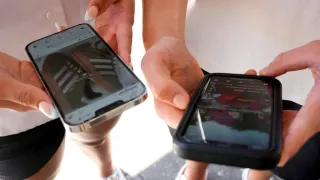August 26, 2017
Dolores Park Shooting Prompts Meeting
Sari Staver READ TIME: 4 MIN.
A panel of city officials promised neighborhood residents they would seek permanent solutions to crime problems in and around Mission Dolores Park at an August 21 community meeting convened by gay District 8 Supervisor Jeff Sheehy.
More than 100 people packed Dolores Park Church to discuss potential solutions with representatives from the police department, district attorney's office, recreation and park department, and public works.
The ongoing safety problems came to a head August 3, when three people were shot during broad daylight and the park was filled with people. One of the victims remains hospitalized in very critical condition. Several other violent crimes have taken place nearby in recent months, as well, people at the meeting said.
Another victim, Jeffrey Kelton, attended the meeting and spoke to officials.
Sheehy kicked off the 90-minute session with a laundry list of problems, including violence, drug dealing, auto burglaries, homelessness, and vandalism. While the current concerns about the park came about after this month's shooting, the problems are not new, said Sheehy, "and we need to establish a process for dialogue with the community," to come up with permanent solutions.
"We have a beautiful park but we need to change the course of activity there," he added.
San Francisco Police Chief William Scott said the shooting is believed to be gang related but that no suspects have been taken into custody.
"We are putting everything we have" into identifying the perpetrators, said Scott.
Since the shooting, police officers are in the park seven days a week, rather than just on weekends, a staffing pattern that will continue, said Mission Station Captain Bill Griffin.
The pedestrian bridge near Church and 19th streets, where the shooting took place, has been a longtime trouble spot in the park, Griffin acknowledged, but he pointed out that it's also a "great spot" for visitors to see the city skyline.
The city needs a plan to address issues at the bridge, said Griffin, suggesting the possibility of sponsoring events with entertainment or vendors located on the bridge as a means of transforming the park from a place that now often attracts a "criminal element." As happens every summer, there is an uptick in calls to police regarding Dolores Park as the daylight hours get longer.
Recreation and Park general manager Phil Ginsburg said that since the police have begun their daily presence in the park, there has been a "dramatic reduction" in theft, graffiti, and gang activity. He said that the park is "only" losing two to three irrigation heads per week, compared to 20-25 before.
"Homeless encampments remain a challenge," said Ginsburg.
Ginsburg said that the park closes at 10 p.m., and said, "We need to do a more rigorous job" to get that message out.
Assistant District Attorney Justine Cephus said it was "inspiring" to see so many community residents turn out for a safety meeting.
"If I had this many people come forward as witnesses or jurors," the criminal justice system would be more effective, she said. "We rely on people like you" to come forward as witnesses when a violent crime takes place.
Shooting Victim Speaks
Audience members described their recent experiences and offered suggestions for improvement.
Among the first to speak was Kelton, one of the August 3 shooting victims. He suffered a gunshot wound to his leg and now walks with a cane. Kelton thanked the police and first responders for their rapid response that afternoon, noting that they "saved my life."
Kelton said that police "could not possibly have the manpower" to prevent all crime but wondered if a staggered schedule of police presence might be more effective in deterring crime.
"It's not just the park, but the surrounding neighborhood as well," he said.
Kelton's partner, Henrietta Weiner, who manages an apartment building at 19th and Church streets, adjacent to the park, said the "no alcohol" signage at the park "is a joke."
Many people in the park "are drinking," but "I've never seen anyone ticketed for it," she said.
Most of the "disrespect" in the neighborhood comes from people who are "highly educated," said Weiner. While people from all walks of life enjoy the park, Weiner said in the eight years she has lived next to the park she has observed people who appear to have "very high incomes" to be the ones most likely to be leaving their garbage on the ground and using doorways for bathrooms.
In response to Weiner's suggestion that residents meet their neighbors, Sheehy suggested that people set up SF Safe neighborhood watch groups, which his office has helped several groups do.
In response to an audience question about police department policy about people who use, but don't sell, drugs, Scott said that they are cited for misdemeanors and are typically issued tickets, not arrested and prosecuted.
"That is the will of the people" of San Francisco, he explained.
"There is a lot of research that shows that treatment for addiction is a better use of money" than incarceration, he said, adding that the city recently adopted a diversion program to help direct more addicts into treatment.
Cephus said that if there were "drug-free zones" established within the park, prosecutors could seek an enhanced penalty for any drug sales in those areas.
A homeowner on Hancock Street, who identified himself only as Dan, said there is a group of 15-20 homeless people "shooting up all day long" on the hill in the park, with police walking right by them and waving.
"I'm not trying to say all homeless people are bad, but these people are living in the park" and harassing passersby, he said.
Ginsburg said that while homeless people have the "same rights and responsibilities to enjoy the park," people are not allowed to have "structures," cook in the park, or be there after 10 p.m.
"We need to do a better job" with enforcement of those rules, he added.
Following the community meeting, a new organization, the Dolores Park Ambassadors, led a mobile community meeting on a walk through the park. The group, which can be found at http://www.facebook.com/doloresparkambassadors, meets every Monday at 8 p.m. to walk though the park and discuss solutions to grievances and identify ways to keep the community safe and clean. For more information, contact Nick Estrada at mailto:[email protected]






